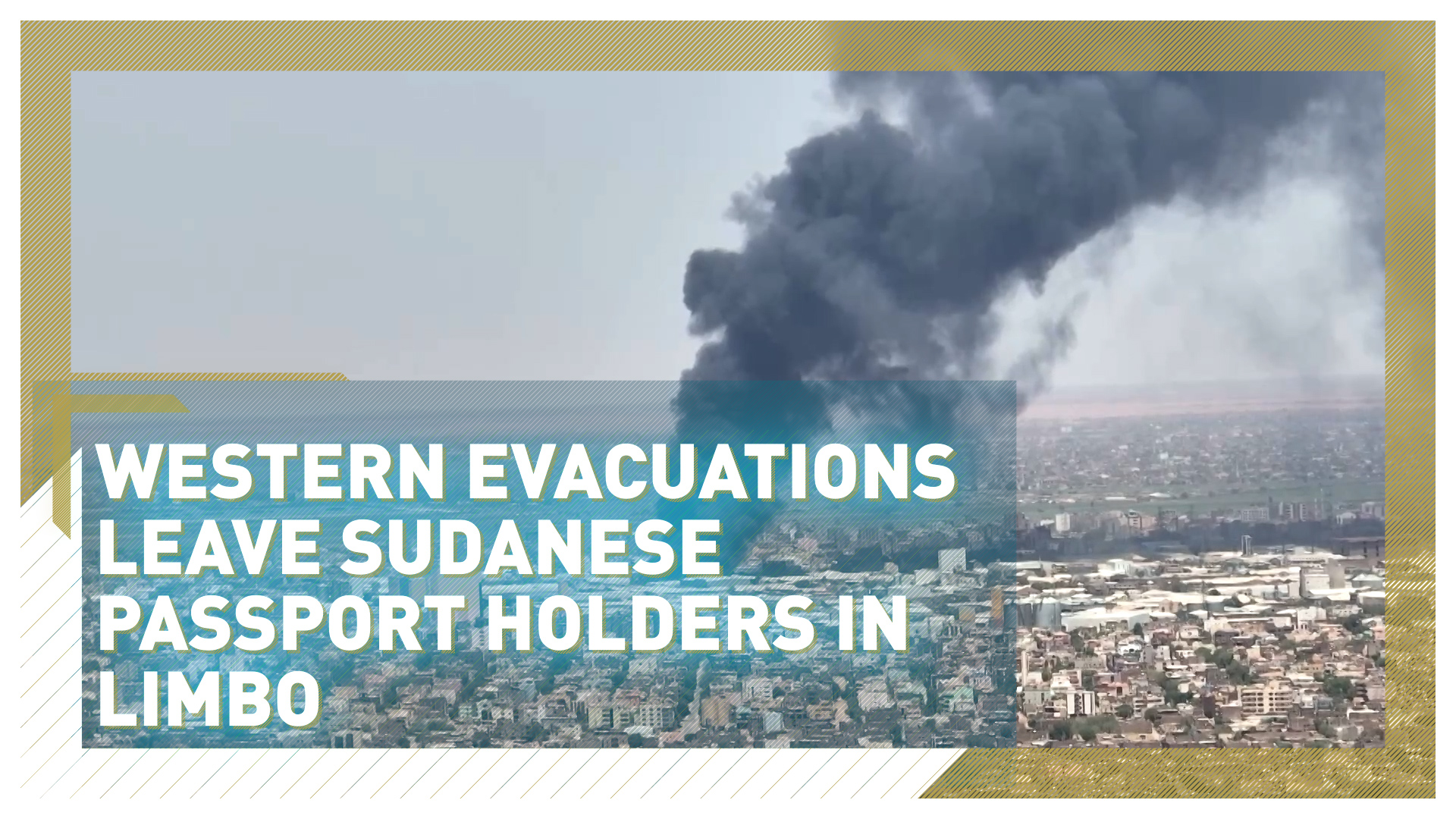02:02

On April 4, Rami Badawi submitted his passport to the French embassy in the Sudanese capital of Khartoum as part of his visa application. Little did he know that they wouldn't be returning it.
Days later, smoke billowed through Khartoum's skies as fierce fighting broke out between Sudanese military and the paramilitary Rapid Support Forces (RSF).
Several Western embassies in the capital rapidly closed down as governments started evacuating their diplomats and consular staff.
"The French embassy closed its doors immediately after evacuating the staff and didn't send any email or clarify the situation," Badawi told CGTN. Without his passport, the 29-year-old cannot now leave the country and remains stuck in Khartoum.
"I contacted the embassy, sent them several emails but without any feedback."
Badawi said this is affecting his whole family, as they insist they wouldn't flee Sudan without him.

Rami Badawi and his family are marooned in Sudan. /CGTN
Rami Badawi and his family are marooned in Sudan. /CGTN
"We hear gunshots everyday," he told CGTN. "It is very dangerous to reach the embassy as it is near to Khartoum airport and the area is now completely controlled by the RSF."
READ MORE
Allege-abusing Syrian migrants sue Bulgarian government
'I begged her to wait' – husband before migrant shipwreck
Italy row grows as Meloni forces boats north
The French Ministry of Foreign Affairs told CGTN: "During the evacuation operation, France took charge of the evacuees (more than 1000, three quarters of them foreigners, including Sudanese) even when they did not have a passport, knowing that their administrative situation would be settled later, outside Sudan, in France or in the country of destination or origin."
Badawi is one of several hundreds left in limbo in war-torn Sudan after foreign embassies evacuated their diplomats, leaving behind passports locked in their now-shuttered consular offices.
CGTN has spoken to many Sudanese nationals who said Western embassies have now urged them to "get a new passport" from local authorities.

The Dutch Foreign Ministry told CGTN that its embassy in Khartoum had been forced to close but that its officers are "actively investigating possibilities to provide individual support."
"The sudden outburst of fighting in the early morning of April 15 forced the Dutch embassy to close with immediate effect. A number of Sudanese passports were left behind at the Dutch embassy," a spokesperson acknowledged.
"These are passports of Sudanese passport holders who have applied for a short-stay Schengen visa or an MVV (provisional residence permit). Unfortunately, we have not been able to collect these passports due to the poor security situation. We understand that this has put the people involved in a difficult situation. We are actively investigating possibilities to provide individual support."
With the country engulfed by violence that has killed at least 500 people and injured nearly 5,000 others, a huge wave of people are fleeing to neighboring Egypt and South Sudan.
But for Mahir Elfiel, 40, fleeing is not an option because his passport is locked inside the Spanish embassy.

Elfiel says he is stuck at Wadi Halfa in Sudan near Egyptian border. /CGTN
Elfiel says he is stuck at Wadi Halfa in Sudan near Egyptian border. /CGTN
"Unfortunately, three days before the date I was supposed to take my passport, the war started in Khartoum," Elfiel told CGTN. "I sent them many emails, tried to call them and even sent them messages on Twitter. They didn't respond."
Elfiel told CGTN he managed to escape Khartoum and has now traveled more than 900 kilometers to Wadi Halfa, a Sudanese city close to the Egyptian border, but cannot cross without his passport.
"The Spanish embassy should be held accountable for this," he insists. "If they can't return our passports, could they do some arrangements with neighboring countries like Egypt to allow us to enter?"
Responding to CGTN, Spanish Foreign Ministry said it has urged people to get "another travel document" from Sudanese authorities and individual cases are being advised of "the best option" possible.
"The Embassy closed its attention to the public and, since the evacuation, there is no longer the possibility of accessing it, among other reasons due to the enormous security risks. This was warned on social media and the people who left their passport there have been urged to obtain another travel document from the Sudanese authorities," a spokesperson said.
"In this sense, individuals who have contacted the Embassy are being answered on a case-by-case basis, advising on the best option."
Many other embassies including the British and Swedish ones have also been accused of not returning passports before evacuating the staff.
The British Foreign Ministry told CGTN that it is "doing everything possible to provide support, recognizing that many people are facing very challenging circumstances and decisions," but wouldn't comment on individual cases.
With shortages of food, fuel, power and water, the situation in Sudan has quickly turned into a humanitarian crisis.
The United Nations said more than 100,000 refugees have now crossed from Sudan to neighboring countries since the beginning of the war and fears that nearly 800,000 are desparately trying to flee.
Subscribe to Storyboard: A weekly newsletter bringing you the best of CGTN every Friday